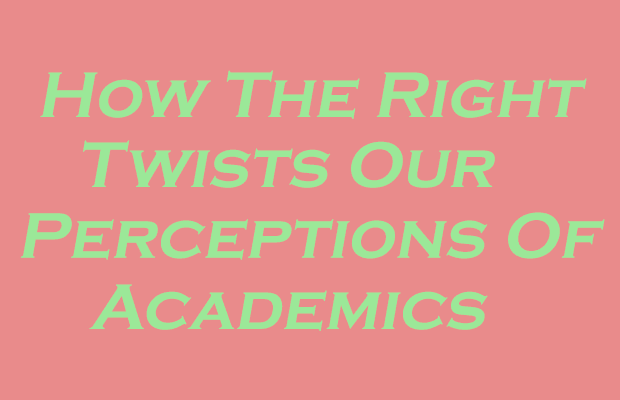A common cry of the bloodthirsty right wing in the culture wars is that academia has a secret, corrosive Marxist agenda, indoctrinating the youth with leftism and producing irredeemably biased research. This claim is used to damage the credibility of academia generally, undermining its perceived authority and framing the right as under attack from elitist socialist academics. It’s worth examining this pervasive claim, why it’s so popular, and what purpose it serves.
The most puzzling aspect of accusations of left-wing bias in academia is the implication of conspiracy. The presence of lefties of various shades in universities is often framed as resulting in discrimination against conservatives, the propagation of biased viewpoints, and the pushing of particular political agendas. If a majority of academics lean left, it’s unclear why that should be construed as being organised or collusive. Instead, it seems plausible that — as with any profession — particular types of people tend to work as academics and have their own personal beliefs that remain largely separate from their work. These worries also foolishly conflate a whole spectrum of left-wing and liberal thought. There is little in common between a socially progressive centrist and a communist, but they would both likely identify as ‘left-wing’. Given that, it’s dubious that a biased agenda or leftist ‘groupthink’ really permeates academic thought.
On top of that, any education about left-wing thought is seen to be biased, while centrist and neoliberal takes are usually viewed as inherently apolitical. Where a neoliberal economics subject seems neutral, a Marxist political economy unit referentially becomes politically charged. Pro-Western Liberal Democracy standpoints are seen as default; anything else is radical. This makes it easy for conservative pundits to overstate the presence of bias within our educations. Moreover, the concern that academics are biased to the left implies that their progressive slant is unjustified. Perhaps it is reasonable for academics in particular fields to overwhelmingly reject conservatism or neo-liberalism if their work leads them to that conclusion.
Claims of bias in education, then, are unconvincing on a number of levels: they assume that some statistical tendency to the left constitutes an agenda or movement; they unreasonably homogenise the left, seeking to substantiate accusations of groupthink; they refuse to give merit to justifiably left-leaning work; and they overstate the existence of radicalism in academia in the first place. Why do they persist?
Promoting distrust of academia serves right-wing populists well. For one, social liberalism is correlated with higher levels of education, making it decidedly in the interests of conservatives to suggest that academics, who are by nature highly educated and often educators, are not credible. By arguing that experts cannot be trusted, their political positions — however internally justified and well-researched — are made suspect.
Pertinently in Australia, where beliefs about climate change are anomalously polarised, and denial is an established conservative political position, it’s also helpful for the right to erode faith in science. While right-wingers would have us think they are the purveyors of facts and logic, evangelical Christianity and fossil fuels interests combine to incentivise opposition to scientific consensus. When universities are taken to be ivory tower hotbeds of Marxist sentiment, it’s far easier to present the climate crisis as a progressive talking point rather than as empirical reality. This is then used to paint climate science as oppositional to the average, common-sense person, thereby legitimising denialism.
The claims of bias play another purpose: they feed into an ideological distaste for access to tertiary education. The ‘Left’ has been the source of historical pushes for opening up universities to working class students, fighting to make university free and opposing moves to deregulate fees. But this threatens universities’ place as a home for wealthy young people to entrench their privilege and for the upper classes to dominate research, public thought, and the media. Presenting universities as overly radical and untrustworthy suggests that academia’s current work is value-less: simply look at rhetoric about jobless arts students being fed with a left-wing agenda. In doing so, it becomes easier — if not actively popular — to cut funding and other forms of support to universities’ work.
Anti-academic rhetoric is a harmful tool of right-wing populism, used to shut down opposition and demonise expertise. Despite being unfounded, allegations of left-wing bias in academia are regrettably effective in undermining academics work. This is not by accident, but motivated by a disregard for research, critique, and democratic access to education.





